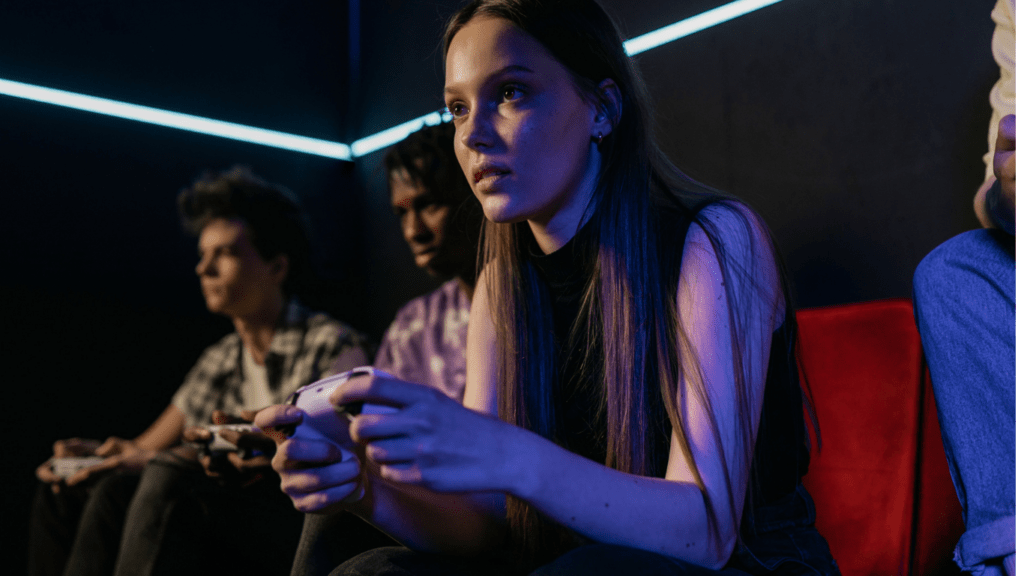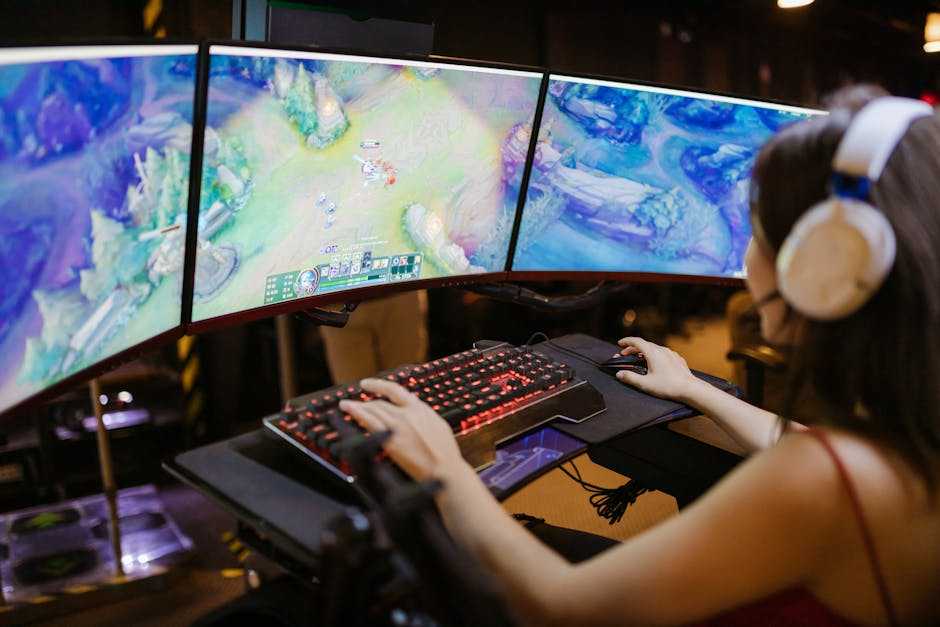Women in Esports: An Overview
Female participation in esports has grown significantly over the years, challenging the male-dominated scene. In 2021, women accounted for 30% of the esports viewership, which showed a substantial increase from previous years.
Key Contributions
Women have made notable contributions in various esports roles such as:
- Professional Players: Women like Sasha “Scarlett” Hostyn and Katherine “Mystik” Gunn have earned significant prize money in competitive gaming.
- Commentators: Figures like Eefje “Sjokz” Depoortere have become prominent voices in the community, providing expert analysis and commentary.
- Team Managers: Women such as Jess “BiBiAhn” Bolden lead top-tier esports teams, driving strategies, and managing player dynamics.
Breaking Stereotypes
Female gamers continue to debunk stereotypes by achieving high ranks in games and maintaining professionalism.
In 2019, the all-female Overwatch team, the “Washington Justice,” made headlines, proving that skill knows no gender.
Supportive Initiatives
Initiatives supporting women in esports contribute to their increasing presence like:
- Tournaments: All-women tournaments, such as the Women’s Esports League (WEL), provide a platform for female competitors.
- Scholarships: Educational institutions offer esports scholarships specifically for women, encouraging their participation.
- Community Groups: Groups like “Women in Games” create networking opportunities and foster a supportive community.
Challenges Faced
Despite progress, women in esports face challenges, including gender discrimination and lower prize pools in female-specific tournaments.
Female players often encounter online harassment, which can deter participation.
Future Prospects
The future looks promising as organizations and sponsors increasingly recognize the value of diversity.
More mixed-gender teams and inclusive policies are on the horizon, setting the stage for even greater female involvement in esports.
The Evolution of Female Participation in Esports
Early Beginnings to Present Achievements
The history of women in esports dates to the early 2000s when competitive gaming started gaining traction.
Back then, female participation was limited, with only a few women competing at high levels.
However, pioneers like Christine “Hellslayer” Chi and Kornelia “Ant1ka” Pavel were among the first to make a mark.
Over the years, female gamers gradually began seeing more success and recognition.
Sasha “Scarlett” Hostyn became the first woman to win a major StarCraft II tournament in 2012. Her success broke barriers, showing that talent knows no gender bounds in esports.
Now, female participation is more visible across various games, including League of Legends, Overwatch, and Counter-Strike: Global Offensive.
Currently, women’s involvement extends beyond just playing.
Many women are now involved as broadcasters, team managers, and analysts, enhancing the industry’s diversity.
Their achievements reflect perseverance in overcoming stereotypes and carving out a presence in esports.
Key Milestones for Women in the Industry
Several milestones highlight the progress women have made in esports. In 2014, Katherine “Mystik” Gunn won $100,000 in the Championship Gaming Series, marking one of the highest earnings for a female gamer at the time.
This win signified the potential for women to compete at elite levels and earn significant prize money.
The creation of female-focused initiatives like the Women’s Esports League has also been pivotal.
These initiatives provide platforms for women to compete, hone their skills, and gain exposure. Scholarships specifically for female gamers have also emerged, encouraging more women to consider esports as a viable career path.
Eefje “Sjokz” Depoortere, known for her work as a League of Legends commentator, has set a standard for female presenters in esports.
Her professionalism and knowledge have earned her multiple awards, showcasing that women can excel in every role within the industry.
Across these milestones, the theme remains consistent: women are not just present in esports; they’re excelling, innovating, and leading.
Barriers Facing Women in Esports
Gender Bias and Disparities
Gender bias remains a significant barrier. Female gamers often face judgments and assumptions about their skills solely based on their gender.
Among the most glaring disparities, pay and sponsorship gaps are prominent. For instance, male players generally attract higher sponsorship deals and earn more in prize money.
The dearth of women in high-level team rosters also highlights a lack of equal opportunities.
Despite equal skill levels, women frequently encounter resistance and skepticism from both peers and industry leaders.
Organizations like the Women’s Esports League and initiatives granting scholarships to female gamers are trying to address these issues, but widespread change is slow.
Harassment and Social Challenges
Harassment is a prevalent issue. Many women in esports endure verbal abuse and gender-based slurs during live streams and competitions.
This hostile environment can deter potential talent and affect mental health. Social challenges, such as balancing gaming careers with societal expectations, further complicate involvement.
Women often find themselves navigating male-dominated spaces with limited support networks.
Though community-led initiatives and companies are rolling out stricter anti-harassment policies, significant progress is still needed to create a safe and inclusive environment.
Successful Women in Esports
Profiles of Prominent Female Gamers
Numerous women have made significant impacts in esports. Christine “Hellslayer” Chi, known for her success in various fighting games, has become a prominent name.
Her skill and dedication have earned her respect and admiration in a male-dominated genre.
Kornelia “Ant1ka” Pavel, a Counter-Strike: Global Offensive player, has shattered stereotypes by competing at high levels and achieving notable victories. Her presence on stage inspires other female gamers to pursue their ambitions.
Sasha “Scarlett” Hostyn, recognized as one of the best StarCraft II players, broke records by winning major tournaments and consistently outperforming many of her male counterparts.
Her achievements exemplify excellence and perseverance in esports.
Teams and Organizations Led by Women

Several teams and organizations in esports are led by women, pushing for inclusivity and representation.
- CLG Red, an all-female Counter-Strike: Global Offensive team, has made headlines by performing admirably in various competitions. Under the leadership of strong female figures, the team has become a beacon for aspiring female players.
- Team Dignitas has an all-female League of Legends squad that competes at a high level and actively advocates for women in esports. The organization’s commitment to nurturing female talent sets a standard for the industry.
- Empress Gaming, founded to support women in gaming and esports, provides resources, training, and opportunities for female gamers.
The organization exemplifies the rising influence of women-led groups in the industry, creating a more balanced and inclusive competitive scene.
Initiatives to Promote Inclusivity
Nonprofits and Advocacy Groups
Numerous nonprofits and advocacy groups actively work to promote inclusivity in esports.
Women in Games International (WIGI) provides resources, networking, and mentorship opportunities for women in gaming.
They host events and webinars to support skill development and professional growth.
AnyKey, an advocacy group co-founded by Intel and ESL, champions diversity, inclusion, and equality in gaming.
AnyKey’s Good Luck, Have Fun (GLHF) pledge encourages respectful behavior in gaming communities.
FemDevs advocates for Latin American women in tech and gaming, offering workshops and scholarships to foster careers in these fields. These organizations drive change by offering crucial resources and support.
Major Industry Efforts and Campaigns
Major industry players also contribute to inclusivity in esports through various efforts and campaigns.
Riot Games launched the VCT Game Changers program to create competitive opportunities for women in Valorant. This initiative includes tournaments and skill-building clinics.
Blizzard Entertainment introduced the Overwatch Contenders Trials to provide women and other underrepresented groups a platform to showcase their talents.
Electronic Arts (EA) implemented the Apex Legends Global Series (ALGS) with inclusivity guidelines, ensuring diverse player representation.
Additionally, Twitch runs the Women’s Alliance program to support female streamers through mentorship and visibility boosts. These efforts reflect the industry’s commitment to fostering a more inclusive environment for all participants.


 Rosendor Smithiery, the founder of Infinity Game Saga, plays a pivotal role in shaping the direction and content of the platform. As the visionary behind the site, Rosendor’s leadership and passion for gaming drive the company’s mission to deliver top-notch gaming coverage. In addition to his executive role, he actively contributes to writing articles, offering his deep insights and expert perspectives on various gaming topics.
Rosendor’s hands-on approach ensures that Infinity Game Saga maintains a high standard of quality and relevance. His articles often explore emerging trends, provide detailed analyses, and offer unique viewpoints on the gaming industry. By blending his leadership with his writing, Rosendor enriches the content and connects with readers, solidifying Infinity Game Saga’s reputation as a leading voice in gaming media.
Rosendor Smithiery, the founder of Infinity Game Saga, plays a pivotal role in shaping the direction and content of the platform. As the visionary behind the site, Rosendor’s leadership and passion for gaming drive the company’s mission to deliver top-notch gaming coverage. In addition to his executive role, he actively contributes to writing articles, offering his deep insights and expert perspectives on various gaming topics.
Rosendor’s hands-on approach ensures that Infinity Game Saga maintains a high standard of quality and relevance. His articles often explore emerging trends, provide detailed analyses, and offer unique viewpoints on the gaming industry. By blending his leadership with his writing, Rosendor enriches the content and connects with readers, solidifying Infinity Game Saga’s reputation as a leading voice in gaming media.
